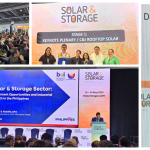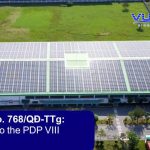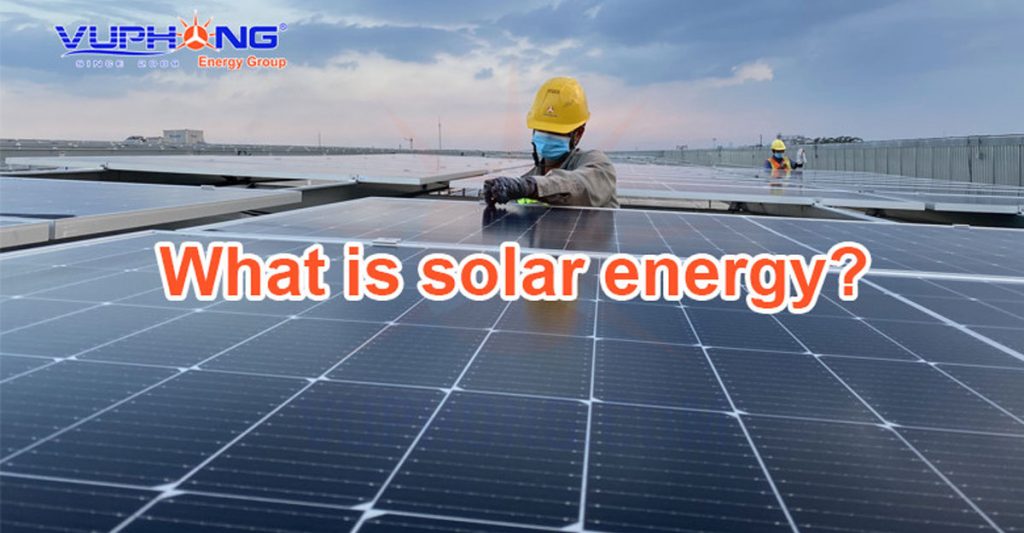
What exactly is solar energy? What is the use of solar energy in everyday life? What is solar power, what types of solar power systems are there? This article will be of great detail!
What is solar energy?
Solar energy was the first energy source in the world that humans used before discovering how to make fire. Solar energy is defined as radiant light and heat from the Sun.
The majority of renewable energy on Earth is derived from solar energy and its secondary resources such as wind, waves, water, biomass, and so on. Humans and other living organisms cannot survive without the Sun and its energy.
What is the purpose of using the solar energy?
The Sun creates both heat and light. Like all living organisms, humans need heat and light to survive and develop. As a result, when asked what the effect of solar energy is, the first thing that comes to mind is its vital role in the lives of all living organisms on Earth, such as photosynthesis, lighting, space heating, hot water supply,…
So, what do humans use solar energy for? Some uses of solar energy in human life include producing hot water from sunshine, developing heating, cooling, and ventilation systems, assisting with water distillation, turning salty or brackish water into drinking water, and utilizing it for cooking, drying, and sterilization…
 Solar energy is necessary for the existence of all living things on this earth (Internet Illustration Images)
Solar energy is necessary for the existence of all living things on this earth (Internet Illustration Images)
Moreover, what else may solar energy be utilized for? Solar energy, is a renewable energy source with an abundant and infinite supply that is also clean and environmentally friendly. Using solar energy rather than fossil fuels also helps reduce pollution and greenhouse gas emissions.
As a result, humans are always improving technology to exploit this natural resource more effectively. Solar power is a popular use of solar energy in today’s world.
What is solar power?
Solar power is electricity produced by equipment that uses Sun energy as its fuel source. Solar power is considered a renewable energy source that should be encouraged for development since it not only provides many benefits to people but also contributes to the ongoing global climate change affecting the lives of humans and other organisms on Earth.
What are the applications of solar power? Solar power is used to power all types of electrical devices, including lighting systems (all types of lamps), cooling systems (fans, air conditioning…), mobile devices, household appliances, industrial machinery, transportation (all types of vehicles, ships, solar-powered planes), solar-powered water pumps, and so on.
To generate solar power, a solar power system consisting of many components is needed to convert sunlight into electrical energy.
The solar energy system comprises photovoltaic panels (solar panels) and other components that operate on the photovoltaic effect, converting sunlight into electrical energy. The solar energy system’s structure includes components such as:
- Photovoltaic panels
- Grid-connected inverter
- Cabinet for DC/AC distribution and protection (electrical cabinet)
- A mounting frame as well as specialized accessories
- Metering and remote monitoring system for electricity
- Battery storage system (in standalone or grid-tied systems with backup)
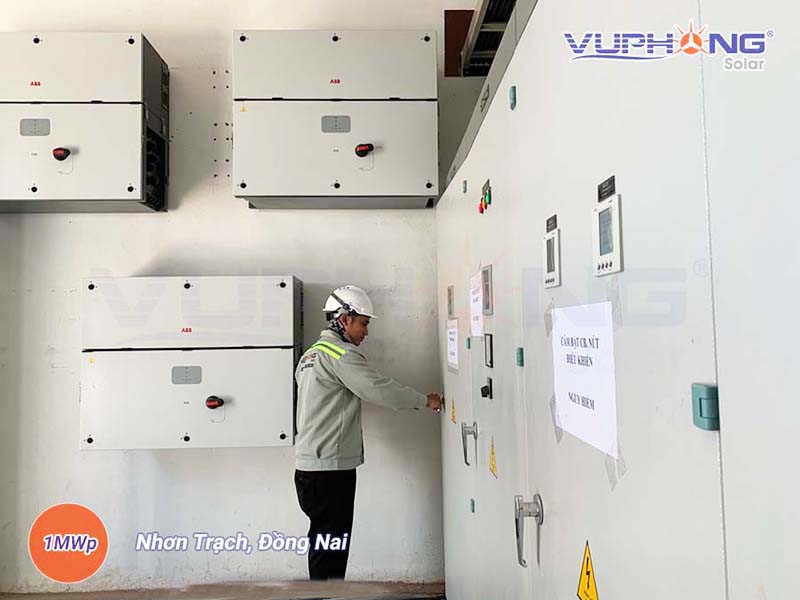 Maintenance of grid-connected inverter – equipment in the solar power system
Maintenance of grid-connected inverter – equipment in the solar power system
Solar power systems are divided into three categories: on-grid, off-grid, and hybrid solar systems. On-grid solar power is the most widely used type today, on both the residential and commercial scales, on rooftops, in combination with agriculture, and for large-scale solar power plants.
What is on-grid electricity?
Photovoltaic panels in a solar energy system create direct current (DC) electricity. An on-grid inverter converts this DC to alternating current (AC) with the same phase and frequency as the national grid’s electricity. Solar-generated electricity is delivered to the electricity grid in an on-grid or hybrid system.
What is on-grid solar power?
An on-grid solar power system is one that is directly connected to the current electricity grid. If the generated solar electricity is not consumed by the electrical equipment, it will automatically flow into the grid without being stored in devices such as acquy or storage battery… in an on-grid solar power system. Solar energy will be prioritized for usage in residences or companies that have this system installed, if there is a power shortage, electricity will be drawn from the grid automatically.
Suppose the solar power system generates more electricity than is consumed. In that case, the excess electricity will be fed into the grid and sold to Vietnam Electricity (EVN) at attractive prices, providing investors with passive income and decreasing the payback time. This contributes to solar power being an efficient and risk-low investment option. (However, the pricing mechanism in Decision 13/2020/QD-TTg for rooftop solar electricity has expired as of December 31, 2020, and is awaiting a new policy.)
As a result, many households, businesses, and investors are installing on-grid solar power systems as environmentally friendly, both use clean electricity and are cost-effective.
What is rooftop solar power?
According to the Prime Minister of the Government’s Decision No. 13/2020/QD-TTg on the policy for rooftop solar power systems, it is a solar power system that satisfies the following standards:
- It has photovoltaic panels put on a building’s rooftop
- Its capacity is limited to 1 MW.
- It is directly or indirectly linked to the electrical grid from the Electricity buyer with a voltage level of 35 kV or below.
Solar energy systems have a normal lifetime of 30-50 years. Users should choose high-quality equipment from reputable brands and ensure proper installation to guarantee the system’s life and profitability. Photovoltaic panels are growing increasingly efficiency, thus users should choose panels with high efficiency from reputable companies to assure the system’s quality.
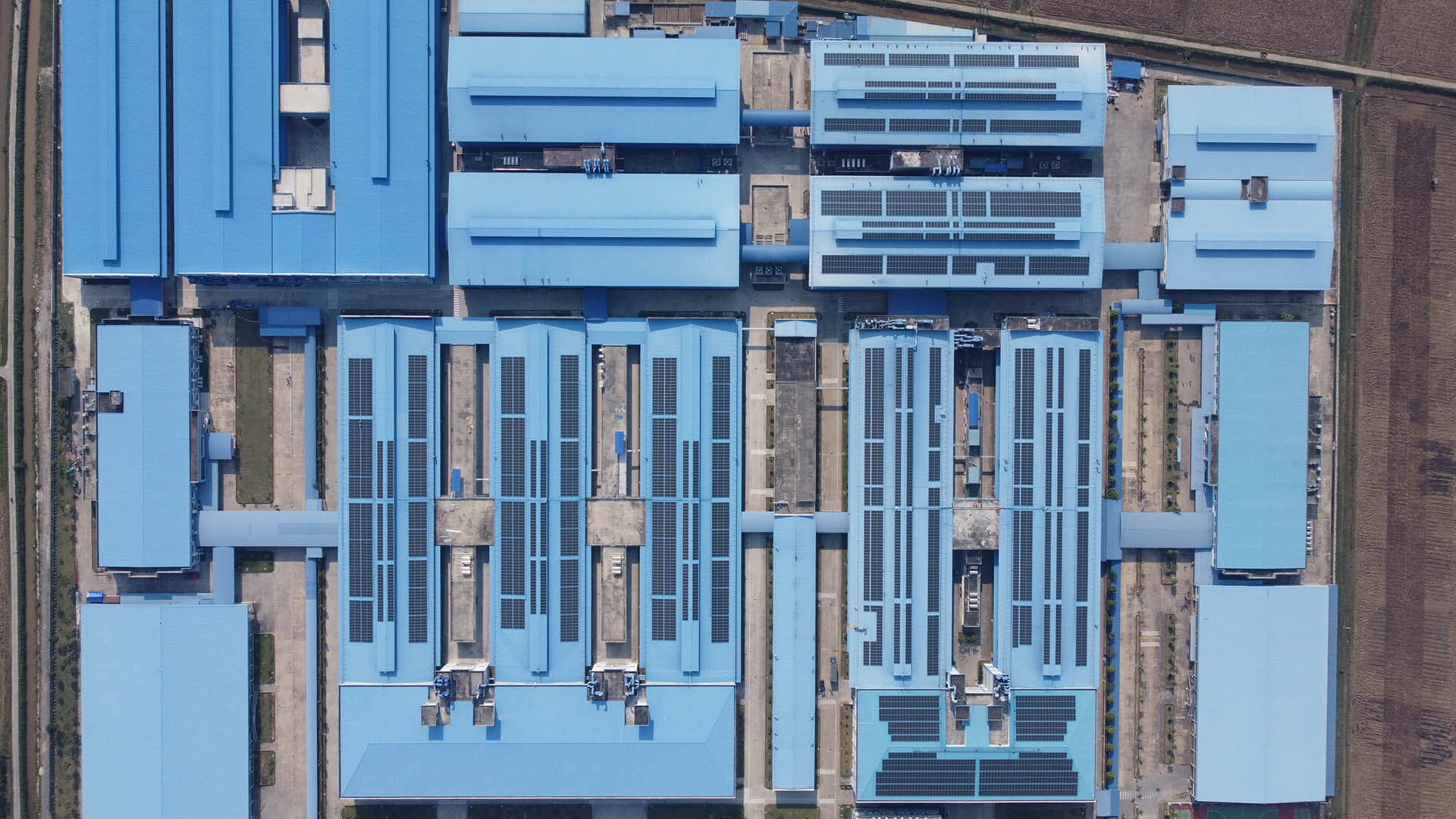 A rooftop solar power system installed by Vu Phong Energy Group
A rooftop solar power system installed by Vu Phong Energy Group
What is the efficiency of solar panels?
In addition to the manufacturer and distributor, the most significant technical specifications to consider when choosing a solar panel are the panel’s power and efficiency. So, how efficiency is a solar panel? The efficiency of a solar panel is defined as the ratio of electricity generated and solar energy received. The following real-life example may show the efficiency of a solar panel: at midday, sunlight emits around 1,000W/m2 per hour. A photovoltaic panel with a 1m2 size and a 10% efficiency will create 100W of power each hour. A photovoltaic panel with a 20% efficiency and a 1 m2 area will create 200W of power per hour.
So, why should you concern about a solar panel’s efficiency? When two panels of the same size are compared, the panel with the better efficiency will produce more electricity. As a result, choosing high-efficiency solar panels for the same installation space (on the roof of a family house, factory roof, office, etc.) increases the system’s power output, producing more electricity. Scientists are now working to optimize the efficiency of solar panels.
This is some information to help you better understand what solar energy is and how it may be used in everyday life, particularly in solar power systems – a common method to exploit solar energy today. If you need more information on solar energy or assistance on how to install solar energy, please contact Our Call Center via 1800 7171 or +84 9 1800 7171 or send an email to hello@vuphong.com for support.
Vu Phong Energy Group

